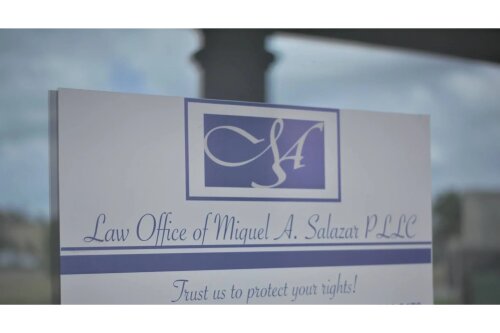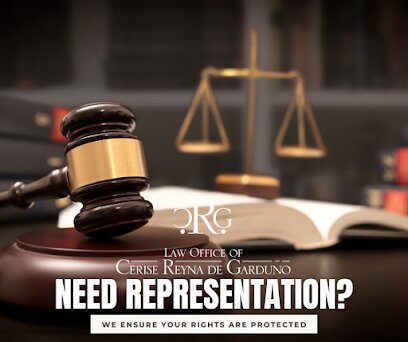Best Family Lawyers in Indiana
Share your needs with us, get contacted by law firms.
Free. Takes 2 min.
Free Guide to Hiring a Family Lawyer
Or refine your search by selecting a city:
List of the best lawyers in Indiana, United States
United States Family Legal Questions answered by Lawyers
Browse our 2 legal questions about Family in United States and read the lawyer answers, or ask your own questions for free.
- Confirming the authenticity of a divorce decree
- I'm married to a Nigerian, and I believe he provided a fake divorce decree, I need help to confirm this decree.
-
Lawyer answer by Nomos Legal Practice
Thank you and best regards, Kingsley Izimah, Esq. SK Solicitors
Read full answer - Child support laws
- If my annual salary is 4 million pesos my wife's salary is 240,000 pesos, and she lives in Rizal, how much will I pay in child support for one child?
-
Lawyer answer by Rana Fazal Muhammad Law Associates
it is the discretionary power of the court to determine the amount for the support of your child, it is not fixed amount
Read full answer
United States Family Legal Articles
Browse our 4 legal articles about Family in United States written by expert lawyers.
- Fighting Custody in Texas: US 2026 Rules for Non-Parents
- Texas has tightened "standing" rules for non-parents in child custody cases: many step-parents and grandparents who used to qualify can no longer file custody suits. Non-parents must now often show they had exclusive care and control of the child for a period of time, not just that they helped raise... Read more →
- Texas Child Support Cap 2026 - Calc Rules
- Texas raises the child support "net resources" cap from about $9,200 to about $11,700 per month starting September 1, 2025, which significantly increases guideline support for higher income parents. For 1 child, the guideline maximum jumps from about $1,840 to around $2,340 per month; for 2 children, from about $2,300... Read more →
- Divorce and Crypto in the United States 2026: Valuing Assets
- Family Law in the United States: Divorce, Crypto, and Complex Assets Family law in the United States is mostly state-specific, but federal tax rules (IRS) heavily affect how you divide assets like crypto, stock, and retirement accounts. Crypto acquired during the marriage is usually marital property, subject to division like... Read more →
About Family Law in Indiana, United States
Family law in Indiana covers a wide range of legal issues that impact family relationships and domestic matters. This includes marriage, divorce, child custody, child support, adoption, domestic violence protections, and guardianship. The Indiana family court system plays a crucial role in resolving disputes, protecting the best interests of children, and ensuring fair legal processes for families. Whether you are considering marriage, adoption, or experiencing a separation or custody issue, understanding your rights and legal responsibilities is essential. Indiana family law is governed by a combination of state statutes and local court rules, and every case has unique circumstances that can impact the outcome.
Why You May Need a Lawyer
Many family law matters can become complex and emotionally charged. There are several situations where consulting with an attorney can be critical, including:
- Navigating the divorce process, especially when property division or child-related matters are contested
- Resolving child custody and parenting time issues, including modifications to existing orders
- Securing or disputing child support and spousal maintenance (alimony) payments
- Pursuing or contesting adoption
- Establishing paternity and fathers’ rights
- Addressing cases of domestic violence or seeking protective orders
- Dealing with grandparents’ rights and third-party custody cases
- Navigating guardianship of minors or incapacitated adults
In these situations, a family law attorney can help explain your rights, guide you through the legal process, ensure your paperwork is accurate, and represent your interests in court.
Local Laws Overview
Indiana family law is primarily regulated under Title 31 of the Indiana Code. Some key highlights include:
- Dissolution of Marriage (Divorce): Indiana is a "no-fault" divorce state, which means that you do not have to prove wrongdoing to get a divorce. The most common ground cited is an irretrievable breakdown of the marriage.
- Division of Property: Indiana uses the principle of equitable distribution, meaning marital property will be divided fairly but not always equally. This includes all assets and debts acquired during the marriage.
- Child Custody and Parenting Time: Courts determine custody and parenting time based on the best interests of the child. Factors include the child’s age, relationship with parents, adjustment to home and school, and, when appropriate, the wishes of the child.
- Child Support: Indiana uses child support guidelines to determine payment amounts, taking into account each parent’s income, number of children, and other factors like childcare and health costs.
- Protective Orders: Indiana law protects victims of domestic violence through protective orders, which can provide temporary safety and restrict contact between parties.
- Adoption: Both individuals and couples can adopt in Indiana, but the process requires background checks, home studies, and court approval to ensure the best interests of the child.
- Paternity: Legal procedures exist to establish paternity, granting fathers parental rights and responsibilities.
Each family law case is unique, and local court rules or judges may have specific procedures that must be followed.
Frequently Asked Questions
How long does it take to get a divorce in Indiana?
There is a mandatory waiting period of 60 days from the date the divorce petition is filed before a divorce can be finalized. However, if there are complex issues, such as contested custody or property division, the process can take several months or longer.
Can I file for divorce without an attorney?
Yes, you may file for divorce "pro se" (without an attorney). However, if your case involves children, property, or contested issues, it is highly recommended to seek legal advice to protect your interests.
How is child custody decided?
Indiana courts base child custody decisions on the best interests of the child, considering factors such as each parent’s ability to provide for the child, the child’s relationship with each parent, and other relevant circumstances.
How is child support calculated?
Child support is determined using the Indiana Child Support Guidelines. The calculation considers the incomes of both parents, the number of children, healthcare and childcare expenses, and other relevant factors.
What qualifies as marital property in Indiana?
Marital property includes all assets and debts acquired by either spouse during the marriage, regardless of whose name is on the title. Some exceptions may apply for inheritances or gifts received by one spouse.
Can grandparents get visitation rights?
Yes, Indiana law allows grandparents to request visitation in certain circumstances, such as when the marriage of the parents has ended or one parent is deceased. The court will determine if visitation is in the child’s best interests.
What should I do if I am a victim of domestic violence?
You can seek immediate help by contacting law enforcement or a local shelter. You may also file for a protective order at your county courthouse to prevent further abuse.
How does adoption work in Indiana?
Adoption involves a legal process where parental rights are transferred. This typically requires background checks, a home study, and approval from an Indiana court to finalize the adoption.
How is paternity established?
Paternity can be established voluntarily through an affidavit or by court order. Once established, the father gains legal rights and responsibilities regarding the child.
Can child custody or support orders be changed?
Yes, you can request a modification of custody or support if there is a substantial and continuing change in circumstances, such as a change in income or the needs of the child.
Additional Resources
If you need more information or assistance, these resources can help:
- Indiana Legal Services - Offers free or low-cost legal help for qualified individuals
- Indiana Department of Child Services - Provides information on child support, adoption, and child welfare
- Indiana Supreme Court Self-Service Legal Center - Access to self-help forms and guides
- Local Circuit or Superior Courts - Your county courthouse is the place to file family law cases
- Victim Assistance Programs - Offer support and resources for those impacted by domestic violence
- Local Bar Associations - Many provide lawyer referral services
Next Steps
If you are facing a family law issue in Indiana, start by gathering information and organizing any relevant documents, such as marriage certificates, financial statements, and any existing court orders. If your situation is urgent, especially in cases involving safety or children, seek immediate assistance from law enforcement or a qualified attorney. For most family matters, it is advisable to consult with a family law attorney to discuss your options, understand your rights, and develop a plan of action. You may also visit your local court’s self-help center or contact a legal services organization if you need assistance finding legal representation. Taking early and informed steps can help protect your interests and guide you toward the best possible outcome.
Lawzana helps you find the best lawyers and law firms in Indiana through a curated and pre-screened list of qualified legal professionals. Our platform offers rankings and detailed profiles of attorneys and law firms, allowing you to compare based on practice areas, including Family, experience, and client feedback.
Each profile includes a description of the firm's areas of practice, client reviews, team members and partners, year of establishment, spoken languages, office locations, contact information, social media presence, and any published articles or resources. Most firms on our platform speak English and are experienced in both local and international legal matters.
Get a quote from top-rated law firms in Indiana, United States — quickly, securely, and without unnecessary hassle.
Disclaimer:
The information provided on this page is for general informational purposes only and does not constitute legal advice. While we strive to ensure the accuracy and relevance of the content, legal information may change over time, and interpretations of the law can vary. You should always consult with a qualified legal professional for advice specific to your situation.
We disclaim all liability for actions taken or not taken based on the content of this page. If you believe any information is incorrect or outdated, please contact us, and we will review and update it where appropriate.
Browse family law firms by service in Indiana, United States
Indiana, United States Attorneys in related practice areas.
Browse family law firms by city in Indiana
Refine your search by selecting a city.
















